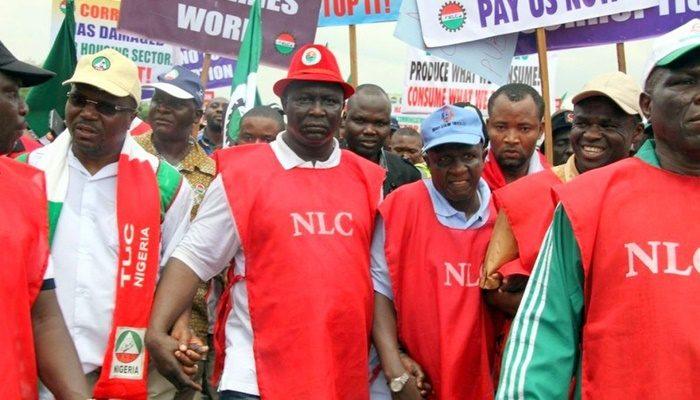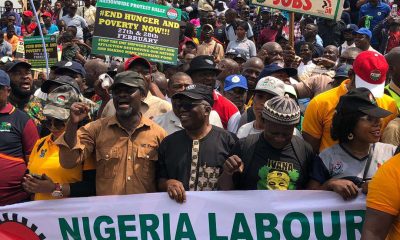Business
Minimum wage: Workers face bleak future as 28 states battle insolvency

A few days ago, the Nigeria Extractives Industries Transparency Initiative (NEITI) disclosed that 28 states of the federation would be unable to fund their 2019 budgets from all revenues – including Federal Account Allocation Committee (FAAC) allocation and Internally Generated Revenue (IGR) – realised in 2017 and 2018. The NEITI report was contained in its Quarterly Review made available by Dr. Orji Ogbonnaya Orji, its spokesperson.
Just last week, the Governor of Central Bank of Nigeria, Mr. Godwin Emefiele, told the Senate during the confirmation screening that the nation faces tough times ahead. These are worrying indications that the economy is not sustainable especially with the new minimum wage which is going to increase financial burden on both federal and state governments.
It is obvious that these states face difficult times ahead and are on the road to insolvency. And if, as is possible, the already volatile oil price dips to 2015 low they would be grounded. Workers, of course, will bear the brunt and we may return the period just after the 2015 elections when President Buhari had to give budget bailout to states to avoid a government collapse.
Yet, while oil price dipping is the worst case scenario, the states, even with oil price above $60 per barrel, will remain in the doldrums as all indices still point to troubled days ahead. In the immediate, the implication of the NEITI report is that projected revenue for 2019 cannot support half of the year’s states’ budgets and inevitably, many of the states will resort to borrowing and would compound already huge domestic and foreign debt profile.
As at December 2018, domestic debts by states and the FCT stood at N3.9trn while foreign debts stood at $4.2bn, according to figures from the Debt Management Office (DMO). External debt owed by Federal Government as at the period was $21bn.
But there is even more troubling development: Economic Confidential on Sunday last week, released its Annual States Viability Index (ASVI) for 2018 and as expected, nothing significant changed from the gloom picture an earlier 2017 report released in 2018 painted. Like the year before, the 2018 report showed that 17 States are insolvent as their Internally Generated Revenues (IGR) within the year were far below 10 percent of their receipts from the Federation Account.
According to the report, IGR of the 36 states of the federation totalled N1.1 trillion in 2018 as compared to N931 billion in 2017, an increase of N172 billion. Of this, Lagos State accounted for N382 billion. A figure higher than that of 30 States put together. But of course, the wage bills of these states are not as meagre as their IGR.
The report identified the states that may not survive without the Federation Account due to poor internal revenue generation to include Ebonyi which realised N6.14bn compared to a total of N76bn it received from the Federation Account in 2018 representing about 7.98 percent; Bayelsa with IGR of N13.6bn compared to FAA of N192bn representing 7.10 percent; Taraba N5.96bnbn compared to FAA of N88bn representing 6.77 percent; Adamawa with IGR of N6.2bn compared to N97bn of FAAC representing 6.77 percent, and Borno with IGR of N6.52bn compared to N122bn of FAA representing 5.3 percent within the period under review.
It noted further that: “The major poor internal revenue earners are Katsina which generated N6.9bn compared to FAA of N138bn representing 5.03%; Yobe N4.48bn compared to FAAC of N89bn representing 4.86% and lastly Kebbi N4.88bn IGR compared to FAA of N101bn representing 4.88%.”
The report again showed that only three states in the entire Northern region have IGR above 20 percent in comparison to their respective allocations from the Federation Account. They are Kwara, Kano and Kaduna States. Meanwhile seven states in the South recorded over 20 percent IGR in 2018. They are Lagos, Ogun, Rivers, Edo, Enugu, Ondo and Delta States.
The four Southern states with the poorest Internally Generated Revenue of less than 10 percent compared to their FAAC in 2018 are Akwa Ibom, Ekiti, Ebonyi and Bayelsa. Similarly, 13 Northern States have poorest IGR, namely Benue, Nasarawa, Gombe, Zamfara, Niger, Bauchi, Jigawa, Taraba, Adamawa, Borno, Katsina, Yobe and Kebbi States.
A similar report by the National Bureau of Statistics (NBS) in 2017 showed that in 2016 30 states generated N516 billion revenue but spent a total of N1.4 trillion on wages. This means that these states spent nearly double of their generated revenue on wages, and were only kept afloat by oil freebies from Abuja and loans.
Indeed, most of these states spend over 70 percent of their total revenue on recurrent expenditure at the old N18,000 minimum wage. The wage has been raised to N30,000. As is often the case, wages would be adjusted across board. The new minimum wage will add over 40 percent to this existing wage bill.
A report in 2017 by Daily Trust had shown that Kano lead the pack of states with huge wage bill. The state, it said, was spending N110.4bn annually to pay 160,000 workers. It was followed by Rivers which was at time, spending N100.8bn on its 25, 000 workers every year. Benue was third, spending N94.8bn annually as salaries for its 44,000 workers.
Others are: Ogun (N92.4bn on 40,000 workers), Delta (N84bn on 47, 203 workers), Lagos (N72bn on100,433 workers), Oyo (N63.6bn on 40, 000 workers), Bauchi (N62.4bn on 92,000 workers), Cross River (N61.2bn on 22,000 workers), Katsina (N60bn on 39,775 workers), Akwa Ibom (N57.6bn on 50, 000 workers), Bayelsa N54bn on 50, 000 workers), Imo (N50.4bn on 40, 000 workers).
Also on a high are: Ondo (N46.8bn on 76,000 workers), Jigawa (N43.2bn on 31,000 workers), Osun (N43.2bn on 35,000 workers), Yobe (N39.6bn on 84,000 workers), Adamawa (N32.4bn on 27,000 workers), Ekiti (N31.2bn on 50, 000 workers), Kogi (N30bn on 13,080 workers), Nasarawa (N28.8bn on 25,000 workers). Others are Kaduna (N26.4bn on 100,000 workers), Kwara (N28.8bn on 72,583 workers), Abia (N26.4bn on 22,103 workers), Niger (N25.2bn on 30, 445 workers), Taraba (N22.2bn on 16,500 workers).
States with relatively low wage bill, according to the report are: Zamfara (N13.2bn on 28,183 workers), Kebbi (N18bn on 19,133 workers); Sokoto (N19.2bn on 26, 000 workers), Enugu N20.4bn on 50, 000 workers and Plateau (N20.4bn on 21, 000 workers).
These figures could only have increased. Over the past few years, governors have relied on Paris Club Debt refund to complement and be able to offset salary areas. But even so, some, like Kogi, Abia and few others are still in several months of salary areas. The Minister of Finance, Mrs. Zainab Ahmed disclosed last week that the Federal Government will soon release the sum of N649.43 billion as the final tranche of the Paris Club Debt refund to state governments. This implies that very soon, governors will not be getting this extra money. And now with minimum wage almost doubled, analysts say the state governments must now shun excesses, and that perhaps, we are facing the inevitability of power devolution to enable the states explore resources from within.
“They can cope if the will is there,” said Chief Emma Nwosu, economic consultant and former MD of Africa Continental Bank (ACB). “There is a lot of waste in government. I don’t know what they are still doing with opaque security votes that nobody knows how it is accounted for. They maintain fleets of cars and a retinue of personal assistants, some they don’t even see in a month and who have nothing to do.
“So, my answer is yes, provided that they will reduce the cost of government. But more importantly, the new wage adjustment will not include those already earning enough. What they often do that is wrong is that when they adjust the salary of the least paid workers, they will then proceed to adjust for everyone up to grade level 17.
“This is the predatory system that we are talking about. Why should somebody who is already earning, say N200,000 a month adjust it again by I think 45 percent. The new minimum wage should stop with the least paid workers. If some people were paid N30,000 before and they now at par with the least paid workers, you can adjust theirs to maybe N40,000.”
Chief Nwosu said it was time for state governments to look inwards, and for the power to be devolved to enable the states explore what they have.
“Our governments should start to look inwards. What they do today is that they gather in Abuja to share oil revenue. But look at what is happening in Zamfara, Gombe, Sokoto, where big men mine gold and other minerals while the states are folding their arms.
“I think it is time for true federalism. If we can empower the states more, they should be able to generate more revenue internally to make sure that the least paid workers are covered.”
Dr. Boniface Chizea, former banker and business consultant also argues that current situation is not sustainable, and that unless the country is restructured in such a way that states would be encouraged to develop capacities, things won’t get any better.
“That’s one of the reasons why a lot of people are calling for restructuring, the need to do that is now glaring,” he said. “I mean, you cannot have states that are not viable all over the place, being dependent, causing problems for everybody and stifling the rate of national growth.
“It is a crying shame, but I think it is also good that it is happening because for those who are trying to resist restructuring, which of course, most of us wonder why it should be so because there is no state in this country that doesn’t have hidden potential to produce something, but when you put a structure in place where you eat without working, then you create disincentive for those who want to work.
“You perpetuate laziness and undermine the growth and development of the country. We need to do something about the structure of this country.”








